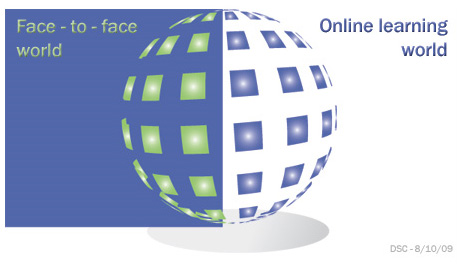From DSC:
When done well, blended/hybrid learning can be very powerful, offering students the best of both worlds:

Numerous technologies involved with education continue to get better. Still, students don’t always have the discipline to be totally on their own…and I often read that learners desire someone to help them navigate through the content. (This can be done online as well, I realize.) Those things said, the article below caught my eye.
How education will be smarter, less intrusive, and able to respond to how you feel — from techcrunch.com by Amar Kumar
Excerpts:
We are on the verge of a tide of smarter innovation that, if allowed to spread, will turbocharge the learning experience for students. Here are four areas worth watching:
- Using technology to learn from learners
- Using technology to adapt to how students feel
- Building invisible assessments that are less intrusive
- Keeping pace with technology in the classroom
…
Take SimCityEdu: Pollution Challenge – developed by GlassLab Games – where students learn how city-planning is impacted by environmental issues. As they play the game, the system is capturing their actions – such as the sequence of what they do or requests for help – and interprets patterns in data to assess how well the player understands important concepts. This helps teachers better evaluate how a student solves problems, rather than just the final product of their work.
In time, learning games like this should decrease reliance on stop-and-test exams and provide more real-time and actionable information to teachers.
Also related/see:
- Search for Quick, Rigorous Ed-Tech Evaluations Underway –– from blogs.edweek.org by Michele Molnar
Excerpt:
Work began [in October 2015] on a federally-funded project designed to quickly determine “what works” with educational technology, so that schools and districts can make faster decisions about it.Mathematica Policy Research won the $3.67 million contract to devise tools for rapid—and rigorous—evaluation of ed-tech products. The goal is to come up with a platform where educators can choose a test that will help them determine—within one to three months—how effective a particular ed-tech product is in their schools. SRI International is a partner on the project.The idea is that the platform will have tools to walk a practitioner, school leader, researcher or app developer through the process of figuring out which research design makes the most sense, and it will ask them questions to help them set it up, said Katrina Stevens, a senior advisor at the U.S. Department of Education’s Office of Educational Technology, which is funding the so-called “rapid-cycle tech evaluation” project. -
Public-university group expands ‘personalized learning’ efforts — from chronicle.com by Ellen Wexler
Excerpt:
The Association of Public and Land-Grant Universities is expanding its support of “personalized learning” with the help of a new $4.6-million grant from the Bill & Melinda Gates Foundation.
“Personalized learning” means different things to different people. It’s a buzzword, and it can be difficult to get past the hype. Depending on whom you ask, it can mean such things as data analytics, video games, or artificial-intelligence research.








